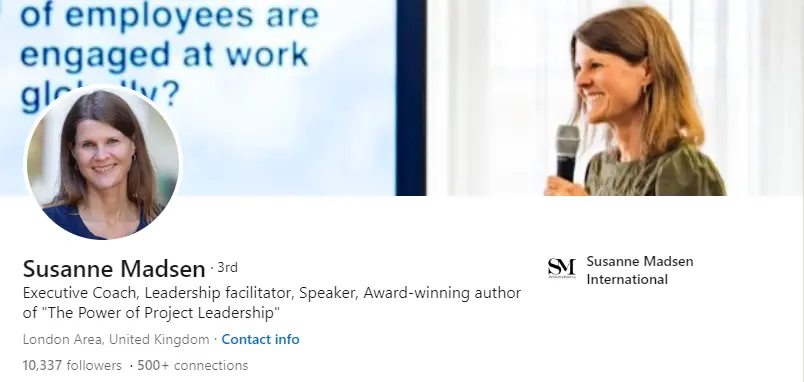
Leadership in Project Management: Expert Tips from Susanne Madsen
Project management often focuses on tasks, process, and tools. However, project leadership coach and author, Susanne Madsen, is here to remind us that project managers are also here to lead a team. “Projects don’t get delivered through tasks. They do get delivered through team interactions,” Susanne told us in a recent interview about leadership in project management.
Leadership skills make project managers effective at influencing even the most senior executive stakeholders; they also help teams deliver successful projects. Because Susanne is one of the project manager influencers that we love to follow on LinkedIn, we sat down with her to get her leadership tips.

Whether you are a project manager or are in another role that requires you to get projects across the finish line, you’ll get a lot out of the 20-minute interview where Visor’s CEO, Michael “Yaro” Yaroshefsky, chats with Susanne about how project management is NOT just about tasks and tools.
Get actionable tips from Susanne about how to position yourself as a leader to executive stakeholders and your team. We also summarized some of the interview’s biggest points in this post.
Leadership in Project Management: Full Interview
Visor CEO and founder, Michael “Yaro” Yaroshefsky, interviews expert voices in project management for our podcast, “On The Roadmap.”
This week, Mike brought on project leadership coach, Susanne Madsen. Check out the full interview below and subscribe to our channel on YouTube to get alerts about future episodes.
Project Management vs. Project Leadership: What’s the difference?
Susanne has literally written the book on becoming a project leader. (See below.)
In this book (and the interview with Mike above), Susanne talks about how “We are here to lead a team. Projects don’t get delivered through tasks; they get delivered through team interactions.”

Susanne notes that project managers (especially more junior PMs) are more task-oriented. However, to lead a team, you must also identify how you can be a leader to your team in addition to managing the tasks that must get done.
“Everything in project management rises and falls on leadership.” – Susanne Madsen
Obviously, project management involves overseeing many tasks. However, Susanne’s main point is that people are performing these tasks and leading them is a necessary (but often overlooked) aspect of project management.
Project Charter vs. Team Charter
Most project managers know what a project charter is; it identifies what the project is, when it’ll be delivered, and how it’ll get delivered.
Susanne points out that few project managers also create documentation around a team charter.
A team charter identifies things like:
- How we are going to work together as a team
- Our values
- Our strengths and weaknesses
- Team motto
- Behaviors we expect amongst the team
Most project managers never get to the team charter, as they’re focused purely on the nuts and bolts of of a project’s delivery, failing to see that people on a team are the ones screwing in these nuts and bolts. How team members work together is an important aspect of delivering a great project.
Susanne points out that junior project managers especially fall into common pitfall of being purely task-oriented. Leadership, however, involves a focus on the team.
Stakeholder Management for Project Leaders
During the interview, the topic of stakeholder management surfaces a lot.
Below are some tips you can implement to work more effectively with stakeholders or even project sponsors.
Tip #1: Work on how well you can influence others
For Susanne, stakeholder management or even “managing up” when speaking with more executive stakeholders or sponsors is about influencing them.
Setting clear expectations (and even boundaries, if need be) in a way that influences others is a soft-skill that many project managers will likely encounter throughout their career. Are we actually managing senior leadership? Of course not. But if you frame “managing up” as influencing, then you can work on the skills needed to be affable while also keeping firm boundaries.
Tip #2: Provide clear options and a strong recommendation
Susanne provides an example of when leadership is helpful with stakeholders. Let’s say you have a “go or no-go” type situation–a fork in the road. Provide your stakeholders with the 2 or 3 clearest options to move forward and a strong recommendation on the best path forward. Providing this level of clarity and a recommendation will bolster how others see you.
Tip #3: Help your sponsors and stakeholders understand their role by asking questions
One helpful tip from this interview is that not all stakeholders or sponsors know exactly their role. You might have to (tactfully) help then understand how they can have the biggest impact on the project and what contributions would be the most helpful.
Framing this conversation as a question (e.g., “I was hoping to get your contributions in the following ways. Is that what you also had in mind?”) will help you get on the same page as your sponsors, while also making their part in this project.
Tip #4: Find your voice. Balance boldness with inquisitiveness.
More junior project managers might grapple with knowing how to set boundaries or make bold recommendations in a way that still comes across as collaborative. Similarly, some newer project managers might struggle asking the necessary questions to stakeholders, in fear that they’ll appear unknowledgeable.
Susanne encourage project managers to find their voice. Know when (and how) to be bold and lean into asking questions when working with stakeholders.
Conclusion: Hone Your Project Leadership Skills to Elevate Your Career
Throughout this interview, Susanne hits home the importance of project managers working on their leadership skills. While tasks, tools, and processes are necessary for a project to get delivered successfully, none of these elements function without a team.
If you are a project manager who wants to grow in your career and possess confidence when working with more senior stakeholders or subject matter expects, positioning yourself as a leader will help you.
By working on your ability to influence, manage up, and even hone documents like a team charter, you will elevate your career. Project managers who only focus on tasks getting done and delivering projects are neglecting a crucial part of this career path: that leading and influencing the people involved in these projects can make or break a project’s success.
And if you want to work on your communication skills and building stakeholder alignment, explore Visor. Visor is the modern and beautiful project portfolio tool, which allows you to seamlessly share updates with external audiences. Visor integrates with apps like Jira and Asana, and offers templates for everything from agile Gantt charts to product backlog templates.





